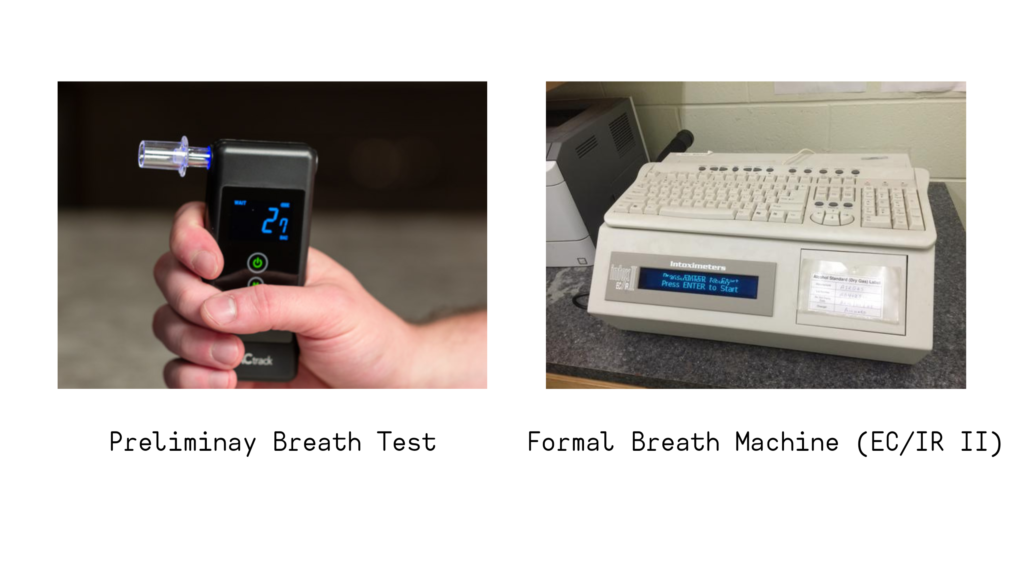When it comes to your rights if stopped for a DUI, we sense a lot of confusion about whether to take the “breath test.” Hopefully, this blog will clear up some confusion when it comes to Virginia DUIs.
What is a Preliminary Breath Test?
When law enforcement is investigating someone for a DUI, they employ Field Sobriety Tests (or FSTs). FSTs are a series of “tests” that law enforcement employ to determine whether they observe “indicators of intoxication” that they can then tell a judge caused them to arrest you. These FSTs typically include:
- One Leg Stand
- 9 Step Walk & Turn
- HGN
- Preliminary Breath Test (PBT)
The PBT is essentially a small box that you blow into on the side of the road, which law enforcement factor into whether to arrest you or not. Under 18.2-267, the Virginia Code specifically discusses the use of a PBT in law enforcement investigations.
Before we go further, let’s discuss what a PBT is not!
The biggest confusion I see in the public is the confusion of the PBT for the formal breath machine that suspects take once arrested and taken back to the police station. Both are “breath tests.” But while you’ll be charged with a “civil refusal” if you reject the breath test at the police station, the PBT is a voluntary test. Learn about the charge of civil refusal here.

The PBT is a voluntary test.
Under Section 18.2-267 (C), the Code states that anyone stopped for a DUI, “shall have the right to refuse to permit his breath to be so analyzed, and his failure to permit such analysis shall not be evidence in any prosecution…” Further subsection (F) states that law enforcement shall “advise the person of his rights under the provisions of this section.” This means that, not only is the PBT voluntary, law enforcement are required by law to inform you that the PBT is voluntary and can’t be used against you in a prosecution.
If the PBT can’t be used against me “in a prosecution,” why does it even matter anyway?
The Courts have interpreted “prosecution” to mean an actual criminal trial. They’ve further interpreted that term to not apply in pre-trial motion hearings, particularly motions to suppress based upon illegal arrests. Stated another way, if you claim that you were illegally arrested because the police lacked probable cause that you committed a DUI, the PBT results are indeed admissible against you.
What’s more, while the “legal limit” of blood alcohol in Virginia is a .08 BAC, Subsection D states, “whenever the breath sample analysis indicates that alcohol is present in the person’s blood, the officer may charge the person” with a DUI. So, there’s an argument that even if you blow below a .08 BAC on a PBT, they may still arrest you properly under this statute.
So, are you saying don’t take the PBT at the scene?
While every case is different, in general, we don’t recommend taking the PBT if you’re being investigated for a Virginia DUI. That’s because it’s a fully voluntary test and by not taking it, your attorney is left with more options to challenge your DUI arrest.
With that said, not taking the PBT may play into challenging your arrest. Indeed, the Court, in Jones v. Commonwealth, 279 Va. 52 (2010), found that refusal to submit to Field Sobriety tests “may have some relevance” in an officer’s decision to arrest a suspect for DUI. Nevertheless, in our experience, it’s certainly better for defense purposes for our client to have refused a PBT than for there to be a positive alcohol reading.
Still have questions?
Make sure to check out our Virginia DUI Practice Page where we’ve answered many other questions you likely have. James Abrenio is a Fairfax-Based Personal Injury & Criminal Defense attorney who practices throughout Northern Virginia. You can learn more about James Abrenio, some of our Prior Results, and Read Our Reviews. Make sure to contact us at Ph. 703-570-4180 for your Free Consultation.
